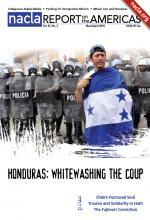Honduras: Whitewashing the Coup

Since the June 28 military coup in Honduras, the country's de facto authorities have maintained a by now well-established track record of attempting to conceal their anti-democratic, violent disposition. This edition of the NACLA Report examines this process in both Tegucigalpa and in Washington—including the lengths to which Honduran coup authorities went both to undertake a show election in November, portraying it as legitimate (false claims of massive electoral participation, unaccredited electoral observers) while using coercive practices against dissidents in the run-up to the election (police attacks on protesters, blacklists of resistance members, shuttered anti-coup media). The result? No future Honduran president can count on fulfilling a term in office if the country’s new oligarchs don’t approve. Moreover, the election that brought Lobo to office has ensured the continuity of the golpista agenda in Tegucigalpa.
